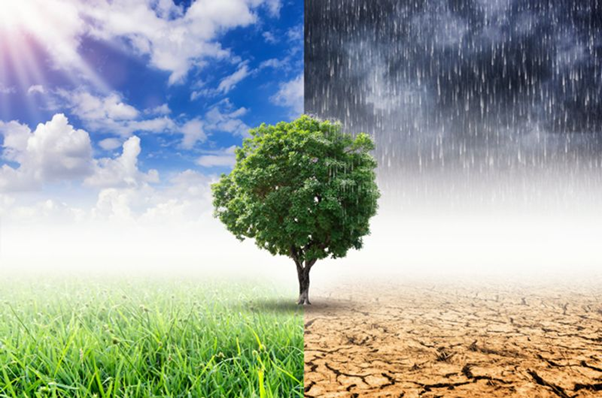Climate change and global warming have emerged as the defining environmental challenges of our time, posing significant threats to ecosystems, human health, and economies worldwide. In 2025, the evidence of climate change’s impact has become irrefutable, with rising global temperatures, increasingly frequent extreme weather events, and accelerating environmental disruptions. Understanding the causes and effects of climate change is crucial to motivate collective action and sustainable solutions.
Understanding Climate Change and Global Warming
Climate change refers to long-term shifts in temperature, precipitation, and weather patterns over decades to centuries. While natural factors like volcanic eruptions, solar variations, and Earth’s orbital changes contribute to climate variability, the dominant driver today is human activity. Global warming, a key aspect of climate change, specifically denotes the rise in Earth’s average surface temperature primarily caused by increased greenhouse gas (GHG) emissions.
Since pre-industrial times, the Earth’s average temperature has risen approximately 1.1°C, with 2024 and 2025 ranking among the warmest years on record. This warming disrupts natural climate cycles and leads to cascading environmental impacts, making global warming a pressing issue demanding urgent attention.
Causes of Climate Change in 2025
The primary human-induced causes of global warming and climate change include:
1. Burning of Fossil Fuels
Coal, oil, and natural gas combustion for electricity generation, transportation, and industry accounts for over 75% of global greenhouse gas emissions. The carbon dioxide (CO₂) released traps heat in the atmosphere, amplifying the greenhouse effect and raising global temperatures.
2. Deforestation and Land Use Change
Forests act as crucial carbon sinks, absorbing vast amounts of CO₂. However, around 10 million hectares of forest are lost annually due to logging, agriculture expansion, and infrastructure development. This not only reduces carbon sequestration but also releases stored carbon back into the atmosphere.
3. Agriculture and Livestock
Agricultural activities contribute approximately 11% of global emissions, mainly through methane (CH₄) from livestock digestion and rice paddies, and nitrous oxide (N₂O) from fertilized soils. These gases have a heat-trapping potential far greater than CO₂, intensifying global warming.
4. Industrial Processes and Urbanization
Manufacturing, waste production, and urban expansion further increase emissions and alter land surfaces, contributing to localized warming effects such as urban heat islands.
Collectively, these human activities have accelerated the concentration of greenhouse gases in the atmosphere, pushing the planet into a warming trajectory that threatens environmental stability.
Effects of Global Warming in 2025
The impacts of climate change are widespread, affecting the environment, ecosystems, societies, and economies in profound ways.
Environmental Impacts
- Rising Temperatures: Earth’s surface temperatures continue to rise, with early 2025 observing record highs globally. This warming disrupts weather patterns and water cycles, leading to prolonged heatwaves and droughts in vulnerable regions.
- Melting Ice and Sea Level Rise: Arctic and Antarctic ice sheets are melting faster than anticipated, causing sea levels to rise. Projections indicate a rise of 0.6 to 1.1 meters by 2100, posing risks of coastal flooding, erosion, and salinization of freshwater sources.
- Extreme Weather Events: The frequency and intensity of hurricanes, floods, wildfires, and storms have increased due to warmer oceans and atmospheric conditions. These events cause widespread destruction and loss of life.
Biodiversity and Ecosystems
- Species Extinction and Habitat Loss: Rising temperatures and altered precipitation threaten species unable to adapt quickly to changing conditions. Coral reefs face bleaching events, polar habitats shrink, and forests become vulnerable to pests and fires.
- Disruption of Ecosystem Services: Changes in biodiversity impact pollination, soil fertility, water purification, and carbon storage, undermining ecosystem resilience.
Socio-Economic Effects
- Food Security: Agriculture faces severe disruption as crop productivity declines due to heat stress, water scarcity, and increased pests. Staple crops like wheat, maize, and rice become vulnerable, causing food shortages and price volatility.
- Economic Loss: Climate-related disasters damage infrastructure, reduce labor productivity, and strain public and private finances, especially in agriculture-, fisheries-, and tourism-dependent economies.
- Social Inequality and Migration: Vulnerable populations, particularly in developing countries, face heightened risks of poverty, malnutrition, and displacement due to climate impacts.
Human Health Impacts
- Increased Disease Burden: Warmer climates expand the range of vector-borne diseases such as malaria, dengue, and Zika virus, increasing incidence rates.
- Heat-Related Illnesses: Heatwaves cause heat strokes, dehydration, and cardiovascular stress, disproportionately affecting the elderly and other vulnerable groups.
- Waterborne and Respiratory Diseases: Flooding and poor water quality promote waterborne diseases, while increased air pollution exacerbates respiratory conditions.
The Urgency of Climate Action in 2025
The scientific evidence is clear that the world must act decisively to curb greenhouse gas emissions to limit warming to below 2°C compared to pre-industrial levels, a target set by the Paris Agreement. The longer mitigation is delayed, the more severe and irreversible the impacts will become.
Despite progress in renewable energy adoption and energy efficiency, global emissions remain high due to continued fossil fuel dependence and deforestation. In 2025, international cooperation and stronger climate policies are imperative to accelerate transitions to sustainable energy systems, enhance carbon sinks, and promote climate-resilient development.
Mitigation measures include:
- Expanding renewable energy like solar, wind, and hydropower.
- Reducing deforestation and promoting afforestation.
- Improving agricultural practices to lower emissions.
- Enhancing energy efficiency in industry and transport.
Adaptation strategies are equally critical to prepare communities for unavoidable impacts. These include climate-resilient infrastructure, early warning systems, sustainable water management, and social safety nets.
Conclusion
Climate change and global warming represent existential threats requiring global solidarity, scientific innovation, and societal commitment. In 2025, the world stands at a crossroads: decisive action can still mitigate the worst impacts and safeguard the planet for future generations. Understanding the causes and consequences of global warming is the first step toward driving meaningful change and building a sustainable future.

